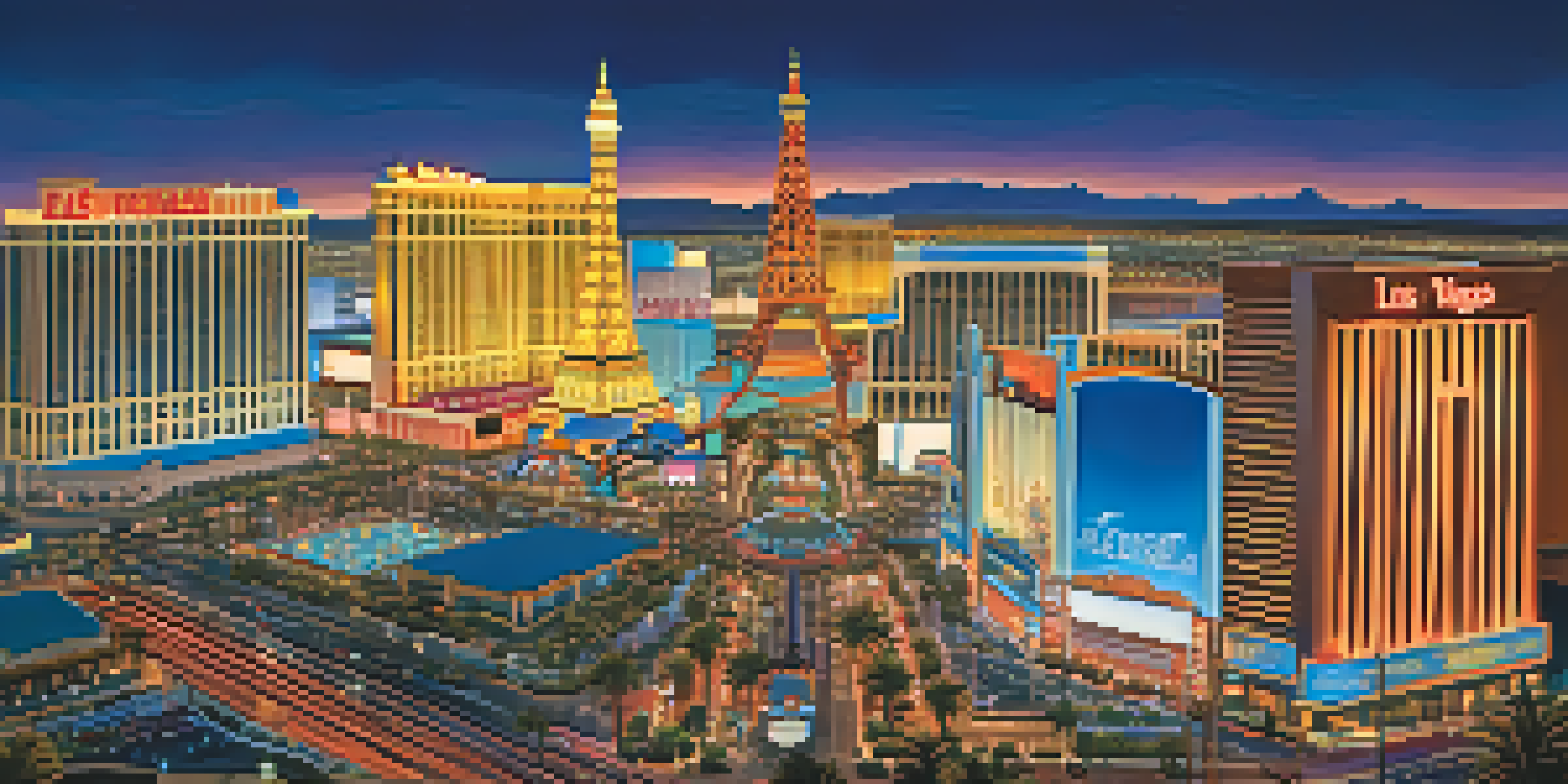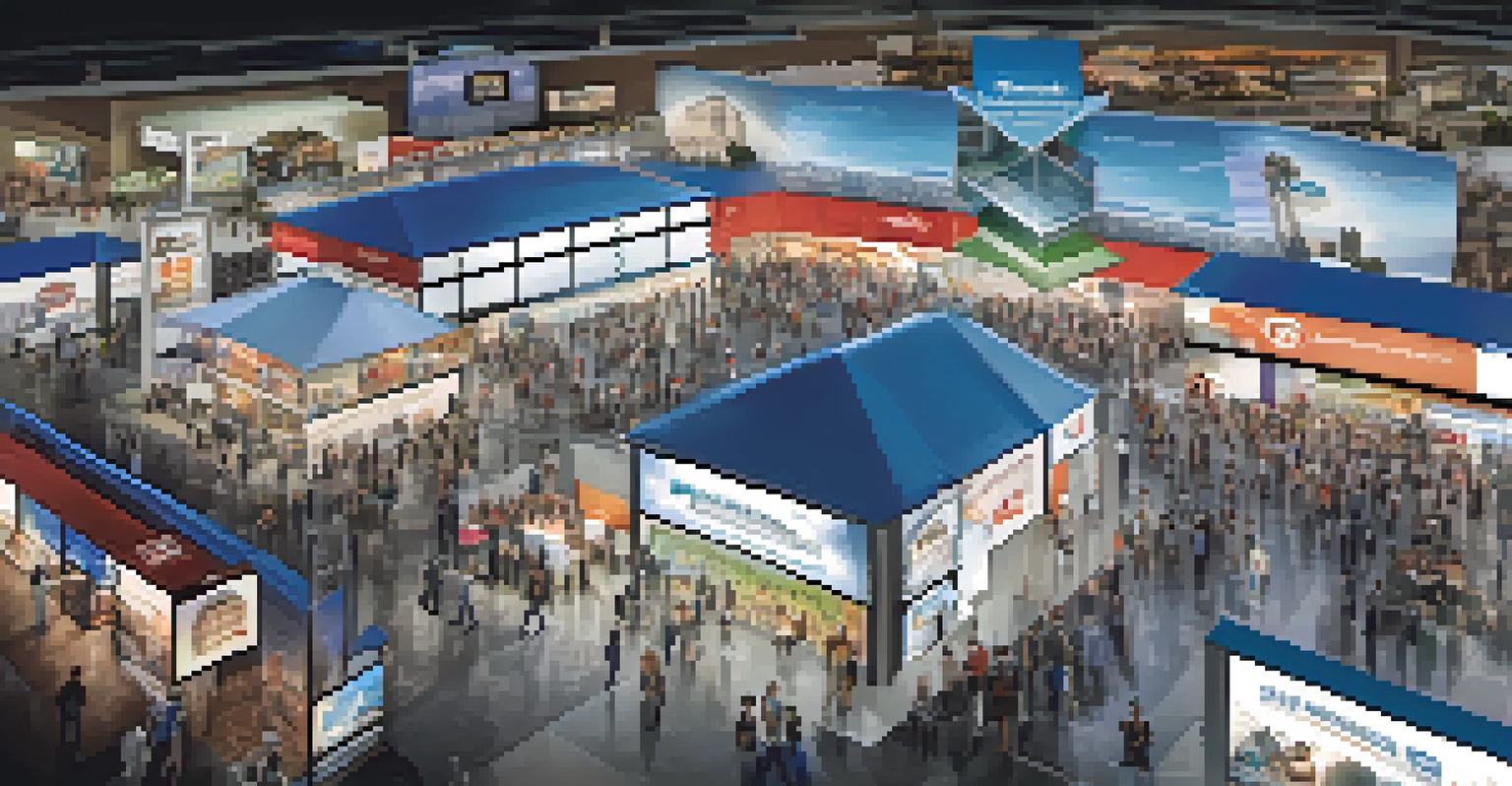Future of Las Vegas: Lessons from Its Historical Growth

Understanding the Historical Growth of Las Vegas
Las Vegas began as a humble desert watering hole in the 1800s, but it quickly transformed into a thriving city. The arrival of the railroad in 1905 marked a pivotal moment, attracting settlers and businesses alike. This initial growth laid the groundwork for its evolution into a major tourist destination, showcasing how infrastructure can drive urban development.
What we learn from history is that people don’t learn from history.
The post-World War II boom was another crucial period for Las Vegas, as soldiers returned home and sought entertainment. The construction of iconic casinos like the Flamingo and the Sands attracted visitors from far and wide, showcasing the city's ability to reinvent itself. This adaptability is a key lesson for future growth, emphasizing the importance of catering to changing demographics and desires.
Today, Las Vegas is a vibrant city known for its entertainment, nightlife, and conventions. Its historical growth reflects a unique blend of entrepreneurship and innovation, which will be essential in navigating future challenges. Understanding this history provides valuable insights into what makes Las Vegas a resilient city.
The Role of Tourism in Shaping Las Vegas
Tourism has always been the lifeblood of Las Vegas, significantly influencing its economy and culture. With millions of visitors each year, the city has become a global hub for entertainment and hospitality. This influx of tourists not only boosts local businesses but also fosters a diverse cultural landscape that enriches the community.

However, relying heavily on tourism can present challenges, especially during economic downturns or global crises. For instance, the COVID-19 pandemic severely impacted visitor numbers, prompting a reevaluation of the city's economic strategies. This situation underscores the importance of diversifying the economy to ensure long-term sustainability.
Tourism Drives Las Vegas Growth
Tourism has been the cornerstone of Las Vegas' economy, shaping its culture and attracting millions of visitors each year.
Moving forward, Las Vegas must continue to innovate its tourism offerings. By embracing new technologies and experiences, the city can attract a broader audience while remaining true to its roots. This evolution will be pivotal in shaping the future of Las Vegas as a tourism capital.
Adapting to Changing Demographics and Preferences
As society evolves, so do the preferences and expectations of visitors. Las Vegas has historically embraced change, adapting its offerings to cater to different demographics. From family-friendly attractions to luxury resorts, the city has shown a remarkable ability to pivot and meet the needs of diverse audiences.
The greatest danger in times of turbulence is not the turbulence; it is to act with yesterday's logic.
Understanding demographic shifts, such as the increasing number of millennials and Gen Z travelers, is crucial. These groups prioritize experiences over material goods, seeking unique and memorable adventures. Las Vegas can capitalize on this trend by creating immersive experiences that resonate with younger generations.
Additionally, incorporating sustainability into the city’s offerings can further appeal to environmentally conscious visitors. This commitment to sustainability, alongside the city’s vibrant entertainment options, could position Las Vegas as a leader in responsible tourism. As the city evolves, embracing these changing preferences will be key.
Leveraging Technology for Future Development
Technology has played a significant role in shaping the modern landscape of Las Vegas. From cashless gaming to virtual reality experiences, the city has consistently embraced innovation to enhance visitor experiences. This technological advancement not only improves efficiency but also positions Las Vegas as a forward-thinking destination.
As we look to the future, the integration of smart city technologies will be essential. These technologies can improve traffic management, enhance security, and create more personalized experiences for visitors. By investing in such innovations, Las Vegas can streamline operations and enhance overall visitor satisfaction.
Adapting to Changing Visitor Needs
Las Vegas has shown a remarkable ability to evolve its offerings to meet the diverse preferences of visitors, particularly younger generations.
Moreover, leveraging data analytics can provide valuable insights into visitor preferences and behaviors. This information can guide marketing strategies and help businesses tailor their offerings. In a city known for its entertainment, using technology to enhance experiences will be crucial for maintaining relevance.
Creating a Sustainable Future for Las Vegas
Sustainability is becoming increasingly important in urban planning, and Las Vegas is no exception. The city faces unique challenges, such as water scarcity and energy consumption, necessitating a commitment to sustainable practices. By prioritizing eco-friendly initiatives, Las Vegas can ensure its growth is not at the expense of the environment.
For instance, adopting green building practices in new developments can reduce energy usage and minimize waste. Additionally, promoting renewable energy sources, such as solar power, can help the city become more self-sufficient. These initiatives not only protect the environment but also appeal to a growing number of eco-conscious visitors.
By fostering a culture of sustainability, Las Vegas can position itself as a leader in responsible tourism. This commitment can attract visitors who prioritize environmental stewardship, ensuring that the city remains an appealing destination for generations to come.
Emphasizing Health and Safety in the Future
Health and safety have taken center stage in recent years, especially in light of global health crises. Las Vegas has responded by implementing stringent health protocols to ensure the safety of its visitors and residents. This proactive approach is essential for rebuilding trust and confidence in travel and tourism.
Moving forward, maintaining high health and safety standards will be crucial. This includes regular sanitation of public spaces, ensuring proper ventilation in indoor areas, and providing access to health resources. By prioritizing safety, Las Vegas can reassure visitors that their well-being is a top priority.
Sustainability is Key for Future
Emphasizing sustainability and eco-friendly practices will be essential for Las Vegas to attract environmentally conscious travelers and ensure long-term growth.
Additionally, promoting wellness experiences, such as fitness retreats and healthy dining options, can cater to a health-conscious audience. As travelers increasingly seek destinations that prioritize their well-being, Las Vegas can capitalize on this trend. By combining entertainment with health, the city can carve out a unique niche in the tourism landscape.
Building a Resilient Economy for the Future
The economic resilience of Las Vegas is crucial for its future success. As seen during the pandemic, relying solely on tourism can expose vulnerabilities. To build a more robust economy, diversification of industries is essential, including technology, healthcare, and education.
Investing in local startups and supporting small businesses can stimulate job creation and foster innovation. By creating a more diverse economic base, Las Vegas can better withstand economic fluctuations and attract a wider range of residents and visitors. This approach not only enhances economic stability but also enriches the community.

Furthermore, collaborating with educational institutions can provide workforce training and development programs. This partnership can equip residents with the skills needed for emerging industries, ensuring that the local workforce is prepared for the future. A resilient economy will support the city’s growth and enhance its appeal as a destination.